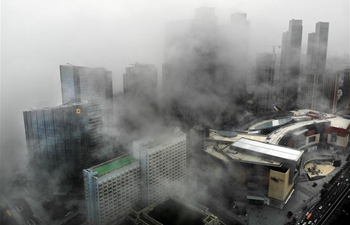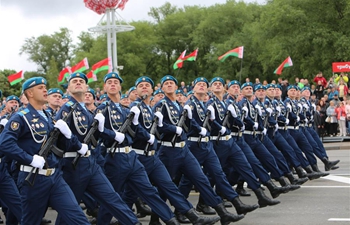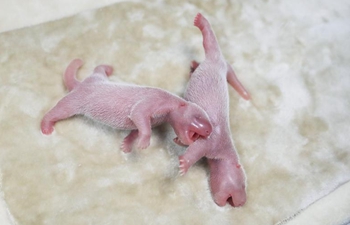by Murad Abdu
ADEN, Yemen, July 5 (Xinhua) -- Yemeni government forces resumed on Thursday military operations against the Houthi rebels in the Red Sea coastal city of Hodeidah, an army commander told Xinhua.
The southern Al-Amaliqah (Giants) Brigades launched a large-scale attack against the Houthi-controlled district of Tuhyata after a four-day pause, the officer told Xinhua on condition of anonymity.
The operation aims at expelling the Houthi rebels out of the strategic port city, after the government forces took over the local airport.
Apache helicopters of the United Arab Emirates (UAE) armed forces operating in Yemen carried out airstrikes at the Houthi-controlled sites in Tuhyta to support the Yemeni ground forces, the source said.
He added that the large anti-Houthi attack against Houthis in Tuhyta is still ongoing and will continue throughout the night till recapturing the whole district.
A Hodeidah-based citizen confirmed to Xinhua that the government forces were heavily shelling the Houthi militants' positions in and around Tuhyta district, causing panic among residents.
Warplanes of the Saudi-led coalition dropped pamphlets on Hodeidah's district of Tuhyata, demanding civilians avoid being near Houthi-controlled positions or militia gatherings.
The Arab coalition also discouraged Yemeni citizens in other provinces from going to Hodeidah and the surrounding areas, only in cases of absolute necessity.
A Yemeni government official said the pause in military action was aimed at giving the United Nations a chance to secure peace talks, but the Houthis didn't abide by it and continued their military activities in Hodeidah.
"The Houthis demonstrated no willingness to withdraw from Hodeidah voluntarily without fighting, and they insisted on military confrontations," the local government source said.
During the past three days, the Houthis carried out a number of armed attacks against the government-controlled positions in Hodeidah and continued to plant landmines despite the fighting pause, the source said.
Mohamed Abdul-Salam, spokesman for the Houthi rebels, denied on Monday that the UAE had stopped its military operations in Hodeidah, noting that the announcement of the pause "was just to mislead the international opinion and to try to obstruct the UN efforts."
Earlier in the day, the Houthi rebels claimed responsibility for launching a drone missile attack against the headquarters of the Saudi Arabia-led coalition in the southern port city of Aden.
The Houthi-affiliated AlMasirah TV reported that "the enemy's (Saudi-led coalition) moves and gathering centers will no longer be safe and the coming days will be witnessing unexpected developments."
A Yemeni military official told Xinhua that the Houthis tried to use an Iranian-made drone to attack the Saudi-led coalition, but the air forces managed to shoot it down without causing any casualties.
Residents in Aden told Xinhua that three loud explosions were heard in Aden's district of Buraiga where the Saudi-led coalition's main headquarters is located.
This was the first time that the Iranian-backed Houthis use drones to carry out attacks against targets in Aden, where the internationally-backed government is based.
Observers said the Houthis missile attack against the Saudi-led coalition base in Aden was a dangerous move that may lead to further military escalation on the ground, particularly in Hodeidah.
Hodeidah is the single most important point of entry for food and basic supplies to Yemen's northern provinces controlled by the Houthis.
Close to 70 percent of the country's imports, including commercial and humanitarian goods, enter the impoverished Arab country through Hodeidah and Saleef, a coastal village in western Yemen.
The Yemeni government and Saudi-led coalition have repeatedly accused Houthis in Hodeidah of hindering or delaying the delivery of humanitarian assistance to the famine-hit areas in the war-torn country.
The UN has warned that the battles to liberate Hodeidah, which has the highest poverty and malnutrition rates in Yemen, could lead to the death of 250,000 people.

















